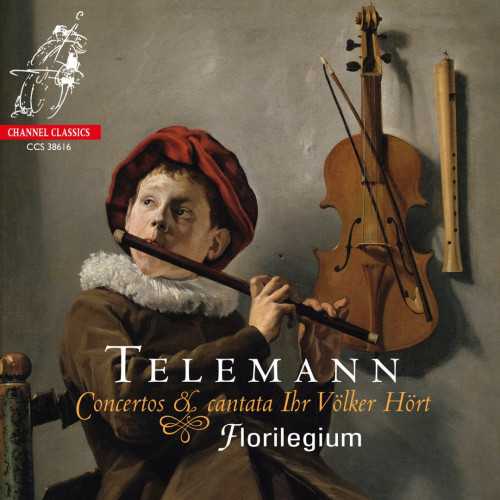
Composer: Georg Philipp Telemann
Performer: Florilegium
Format: DSD64 (dsf tracks)
Label: Channel Classics
Release: 2016
Size: 3.35 GB
Recovery: +3%
Scan: yes
Concerto in E major
01. Andante
02. Allegro
03. Siciliana
04. Vivace
Concerto in A minor
05. Grave
06. Allegro
07. Dolce
08. Allegro
Cantata Ihr Volker hort
09. Aria
10. Recitative
11. Aria Halleluja
Concerto in D major
12. Moderato
13. Allegro
14. Largo
15. Vivace
Concerto a 4 in A minor
16. Adagio
17. Allegro
18. Adagio
19. Vivace
Overture in F major
20. Ouverture
21. Courante
22. Bourree I,II
23. Loure I,II
24. Menuet I,II
25. Forlane
26. La Tempete
Georg Philipp Telemann came from an affluent but unmusical family. Though he showed early promise as a performer and composer, his mother had other ideas and tried to discourage him by confiscating all his musical instruments. As a law student in Leipzig, however, he became increasingly involved in ‘extra-curricular’ musical activities. He composed a cantata every two weeks and had written four operas by the time he gave in totally to his real passion. Fame and fortune in a creative artist’s lifetime do not necessarily presage the judgement of posterity. Throughout Germany Telemann basked in the sunshine of success, far eclipsing his contemporary colleague and occasional competitor Johann Sebastian Bach. In 1722 he was chosen by the city fathers of Leipzig for the position of Kantor at the St.Thomas Choir School; Bach was approached and secured this position only after Telemann had turned the offer down. When City Councillor Platz announced the appointment of Bach as Kantor for the churches in Leipzig in 1723, his pronouncement stated, “Since the best man could not be obtained, mediocre ones would have to be accepted.” Telemann had no intention of going to Leipzig. He simply used the offer to improve his bargaining position at Hamburg, where he established himself as Kantor of the five main churches in the city and ultimately as Director of the Hamburg Opera (an unheard of combination that annoyed the city fathers). He remained in Hamburg until his death in 1767



